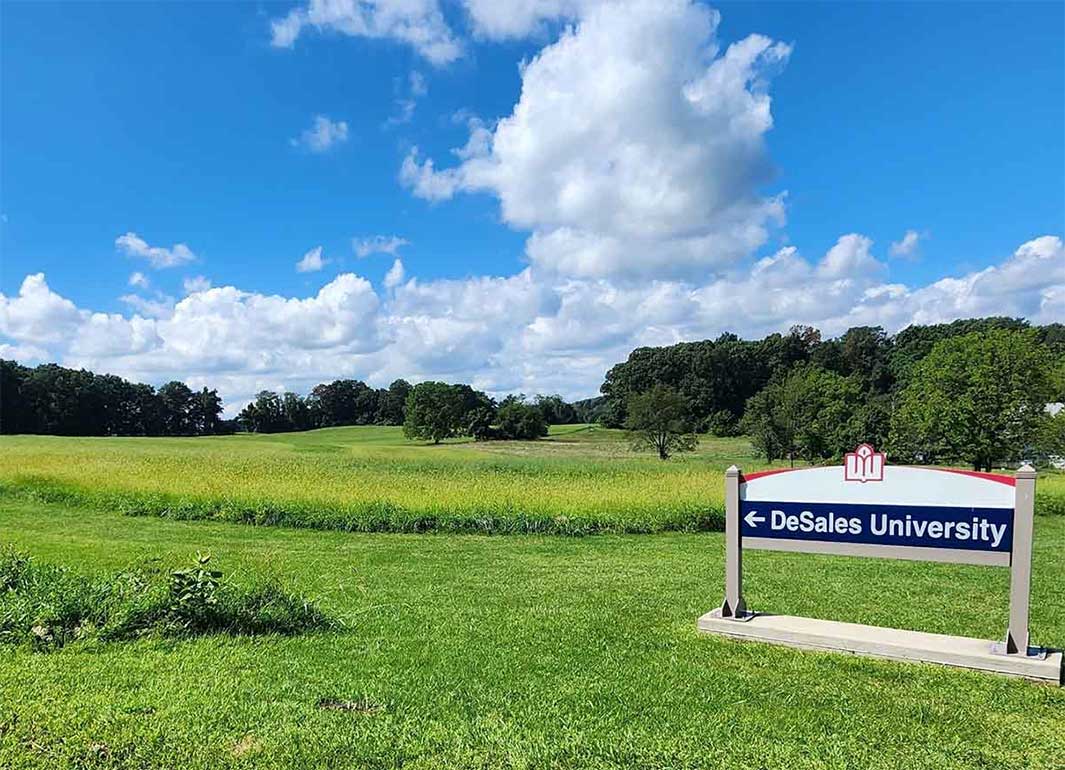Sustainability at DeSales
DeSales is committed to creating a better future through education, community action, and continuous improvement.
As a Catholic, Salesian university, our sustainable initiatives follow the principles of Laudato Si’ (Pope Francis’ encyclical letter on caring for our common home) and its action platform.
By recognizing the connection between God, humans, and the planet, we can take transformative action to care for creation and serve the common good.
In that pursuit, all sustainable action taken at DeSales is rooted in:
- Discovering God in all things.
- Ecological education.
- Responding to the cries of the earth and the poor.
- Adopting sustainable lifestyles that promote sobriety in the use of resources and energy.
- Community engagement and participatory action at various levels.
“All of us can cooperate as instruments of God for the care of creation, each according to his or her own culture, experience, involvements and talents.” – Laudato Si’ 14
Get Involved
DeSales has several departments and student organizations that are helping in the effort to make our campus more sustainable.
- Campus Sustainability Coalition: Comprised of students, faculty, and staff. Contact sustainability@desales.edu.
- The Green Team: A student organization that aims to improve the sustainability of our campus, our community, and our world.
- Students for Sustainability: A student organization that aims to raise awareness about environmental issues.
- Center for Service and Social Justice (CSSJ): Directed by Jaime Gerhart, this center provides public service opportunities for all members of the University community.
Sustainability Initiatives
Four ChargePoint dual charging stations (level 2) can charge up to eight vehicles at one time. Located behind Dooling Hall, these charging stations are open to students, faculty, staff, and the public with electric vehicles.
Located on top of the Isenring Center, this micro-solar system provides energy to charge battery powered tools that are used by our maintenance department.
HVAC Systems: Improving the energy efficiency of the heating and cooling systems in all campus buildings through equipment upgrades and routine preventative maintenance.
Energy Curtailment: Adjusting thermostats to conserve energy during the summer and holiday breaks when buildings are not occupied or are offline.
Appliances: University provided appliances are energy efficient (e.g. washers, dryers, refrigerators, microwaves, and dishwashers).
LED Lights: Most major lighting systems in academic and residential buildings have been converted to LED lights to reduce energy usage.
Occupancy and Vacancy Sensors: Installed in classrooms, offices, hallways, lounges, and restrooms, these sensors shut off lights when spaces are not occupied.
Water conserving faucets, toilets, and shower heads have been installed in all residential buildings and most public restrooms.
Bottle-filling stations (and water coolers) provide cold, filtered drinking water in 17 different buildings on campus. These stations help to keep our campus community hydrated while reducing waste from plastic bottles. We’re working to install these stations on every floor of all residential building.
In an effort to reduce the environmental impact of lawn maintenance, areas on campus have been categorized into one of three zones:
- Zone 1: Traditional Treatment—Receives routine weekly mowing and traditional fertilizer, herbicide, and pesticide treatments. Includes highly visible areas that are routinely utilized, such as the campus mall and athletic fields.
- Zone 2: Mow Only—Receives routine weekly mowing with no chemical treatments. Dandelions may be spotted in these areas between routine mowing sessions.
- Zone 3: Meadows & Minimal Maintenance—Receiving only intermittent mowing and maintenance, these areas have the ability to grow naturally for the majority of the year.
Dining services is helping to create a brighter future through sustainable initiatives that focus on health, the planet, and our people. Initiatives include local suppliers, campus farmers' markets, recycling, eco-containers and straws, and fair trade coffee.
We provide indoor and outdoor single-stream recycling throughout campus, as well as electronic waste (e-waste) recycling.



